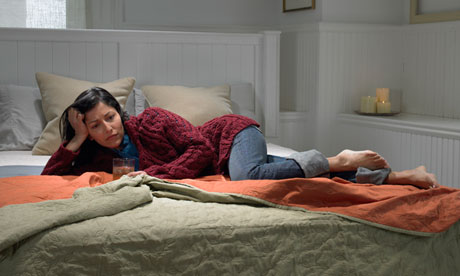
When Selina Khunkhuna was 20 and studying for a history degree at Manchester University, she felt that everything was falling apart. She didn't want to eat or talk to anyone. She struggled with simple things, such as getting dressed in the morning. Several times a day, she would call her mother in great distress, begging her to take her home. Her mother did come, and took her to hospital, where she was diagnosed with depression and psychosis. "It was an incredibly scary time," says Khunkhuna, who is now 30 and works as a psychotherapist.
She comes from a close-knit Sikh family and says that her parents' support was instrumental in her recovery. But there were times when the culture surrounding her made her situation difficult to deal with.
"When I was diagnosed, there was a desire among my extended family to turn to spiritual help instead of seeing it as an illness." Khunkhuna's grandmother took her to temples, and once invited a priest and a faith healer to her house to pray for her. Another time, she was given a coconut and told to throw it into a river.
"Faith is important in times of need, but these things weren't helping," she says. "It gave some of my family comfort, but really I needed medical intervention to get better. The last time I had an episode of depression, I made it clear I wasn't going to seek spiritual or cultural help."
Talking from the Heart, an online social enterprise launched last month, aims to help address the religious and cultural stigmas that sometimes surround mental health. The website, a joint resource between Maslaha, an organisation that seeks to help disadvantaged groups, and AT Medics, London's largest group of NHS GP practices, raises awareness of mental health through a series of short films in Urdu and Bengali. The films feature doctors, counsellors, psychotherapists, imams and religious scholars addressing concerns about depression and anxiety, and explaining that there is no shame in asking for help.
"There is already a stigma in talking openly about mental health. But in many Asian communities, there is an added stigma. Depression is often seen as a western illness and sometimes people view it as a test of faith rather than a medical condition," explains Raheel Mohammed, director of Maslaha. "There isn't even a word for 'depression' in Urdu or Bengali so it is hard to get people talking about it." Mohammed hopes to establish a mentoring and training system so that people from minority communities who have experienced mental illness can act as mentors to others.
In 2011, Time to Change, a programme established by the charities Mind and Rethink Mental Illness, launched a campaign to encourage people of an Asian background with mental health problems to share their experiences. Of the 4,000 people the campaign reached, 67% said their understanding of mental health had improved because of it.
Sue Baker, director of Time to Change, says it is important to demystify the negative assumptions about mental health in Asian communities, where it is often considered a sign of black magic or God's will, or a shameful problem that needs to be kept secret.
"We need to start normalising mental illness for south Asian communities and get positive, factual messages about mental illness out there, such as that mental health problems are nothing to be ashamed of, and people can recover from mental illness with the right treatment and support," she says.
Chandu Shah's son Deepan was diagnosed with obsessive compulsive disorder in 1989 after he finished his degree at the London School of Economics. Shah and his wife have been caring for him ever since. "In our community, mental illness is perceived as a madness, and the worst possible disease. People treat those suffering like lepers. They avoid them and call them names," he says. "We did not want our son to be spoken of like that."
For five years, the family kept Deepan's illness a secret, giving excuses so that they didn't have to attend family social events without him, or face people asking too many questions. But Shah says he realises now that there is an urgent need to speak openly of mental illness, rather than try to hide it. "In Asian communities, we are afraid to open up because of what others will think and this means people may not be receiving the help they need. Families need to seek help early rather than feel ashamed. Times have changed and we need more understanding, more awareness and more compassion. My son has an illness, but he is still my son and the wonderful, intelligent person he has always been."
Khunkhuna believes the south Asian cultural emphasis on family can play a positive and valuable role in caring for those with mental health problems, as it did for her (after her diagnosis, she stayed with her parents, grandmother, uncles and aunts) – but only if barriers of communication can be overcome first.
"Our Asian culture is very family-based, and that's a real strength. But the hardest step is talking about it. At first, my immediate family didn't tell my extended family about what I was going through, to protect me more than anything else," she says. "But talking to them about it really helped. It shared the burden, and now all of my family can relate to and understand what I was going through. I feel as if I have moved on from my illness. Everything is out in the open now. There is nothing to hide."

